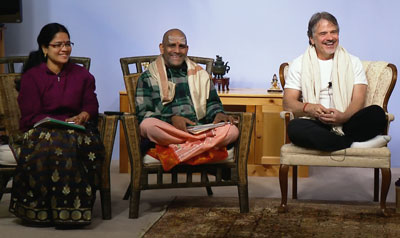by Michael Mamas | Tuesday, August 27, 2013 | Clarifying Confusion, Spiritual Evolution, The Veda |
 The following is a very beautiful comment to the “What is Reality?” blog and very true. I believe that the word, Hindu, was created by the British? It meant followers of Indu! This is just something I learned years ago and can not document it. Of course, there are many philosophies spinning around The Veda. Though different aspects of Veda are called philosophies, they are better thought of as ‘eternal principles’ as stated in the comment. Veda is nature. The mechanics of nature are understood through study of the Veda. The fundamental basis of nature as viewed through western science is the unified field. As in the comment below, it is Oneness, the principle of “advaitha”, non-duality.
The following is a very beautiful comment to the “What is Reality?” blog and very true. I believe that the word, Hindu, was created by the British? It meant followers of Indu! This is just something I learned years ago and can not document it. Of course, there are many philosophies spinning around The Veda. Though different aspects of Veda are called philosophies, they are better thought of as ‘eternal principles’ as stated in the comment. Veda is nature. The mechanics of nature are understood through study of the Veda. The fundamental basis of nature as viewed through western science is the unified field. As in the comment below, it is Oneness, the principle of “advaitha”, non-duality.
I would add that the principle is not understood through study alone. It must be embodied. It must be experienced. This speaks of a level of Unity Consciousness. Not an attitude or belief system but a level of consciousness… enlightenment. Of course, to study it is of great value and facilitates the path to enlightenment… proper meditation also being highly important. Also the word ‘reality’ is often used loosely. I attempted to give some sense of the deeper meaning in the ‘What is Reality’ blog.
Sree, I enjoyed this comment very much. It would be a pleasure to meet you at Mount Soma some day.
Sree’s comment follows:
The word “Hinduism” and “Hindu Philosophy” are wrongly used by many millions in Bharath (India) and throughout the rest of the world.. There is no such word in ancient Indian scriptures. Hindu has no meaning and it does not belong to any of the Indian languages. First of all, Bharath has no religion (reunite) and there is a very good reason for that. We have eternal principles that one must follow. The most important one is “advaitha” or one-ness. In other words, there is no duality in this universe. Once this concept is understood, you understand the reality.
© Michael Mamas. All rights reserved.
by Michael Mamas | Wednesday, August 21, 2013 | Clarifying Confusion, Spiritual Evolution, The Veda |
“A man should look for what is, and not for what he thinks should be.” – Albert Einstein
 This universe is a reality continuum… an infinite number of simultaneously valid yet contradictory realities. On one level, in one reality, you and I are one… everything is the unified field. In the physical reality, you and I are separate. People cling to one reality or another and call it truth. Divergent branches of Hinduism insist they are right and the opposing Hindu philosophy is wrong.
This universe is a reality continuum… an infinite number of simultaneously valid yet contradictory realities. On one level, in one reality, you and I are one… everything is the unified field. In the physical reality, you and I are separate. People cling to one reality or another and call it truth. Divergent branches of Hinduism insist they are right and the opposing Hindu philosophy is wrong.
The enlightened cling to nothing. They align with the reality that best serves the moment. They spontaneous live life in harmony with the reality continuum. They live in freedom. Their life is infinitely creative. What they align with is not based upon what any teacher told them or anything they have been indoctrinated into. They use the philosophies of different realities, yet the philosophies do not use them. They express themselves in terms of popular world views to be understood more easily, but see beyond those views at the same time. They may use quotes and philosophies of famous people to give expression to what they experience, but are not limited by any philosophy, world view, or belief system. An infinite number of world views emerge from deep within them from moment to moment as best serves the situation. They are not enslaved by any world view.
They see clearly. They see what is. They place little value on what they are told should be. It is called spiritual emancipation for a reason. They are free of indoctrination… free of samskaras… free of limitation…. unbounded… infinitely creative from moment to moment. The enlightened live in harmony with nature. Their nature and Mother Nature are one. Nature then determines the philosophy they align with from moment to moment.
If you are to comprehend what is being said here, you must strive to do so. Yet it is quite understandable that you may strive to refute it in order to keep your current understanding, your current knowledge, your current belief system in tact. However, if you do that, your resistance will likely be enough to prevent you from understanding what is being said here. You may try to refute this as another belief system. You may claim you already understand it but just disagree. You may insist that it just does not interest you, or you do not need to know it. You may search for a way to prove it wrong before you really even comprehend it. I assure you it is a profound and most important thing to comprehend. Once comprehended, you will realize that it is the essence of what the tradition of enlightened master, the rishis , were saying. If it were not just that subtle and elusive, everyone would have been enlightened long ago. Also remember, the spiritual path is a long one. A lifetime of study is a very short time. The spiritual path is not measured in years or decades. It is measured in lifetimes.
The knowledge of Veda is sometimes thought of as a secret knowledge. However, it is not a secret because it is hidden away. It is secret because even after reading, studying and listening, it remains a secret to the student. It is as elusive as the mystery of life and existence itself, for that is exactly what it is about.
The genuine spiritual Guru uses philosophies to lead the student to a place that lies beyond the grasp of all philosophies. This level of teaching is extraordinarily rare and oh so very precious.
© Michael Mamas. All rights reserved.
by Michael Mamas | Wednesday, July 11, 2012 | The Veda |
 The Veda is the underlying essence and structure of creation. Born of the Self-interacting dynamic of Oneness, consciousness, its structure is the language of nature… infinitely rich and all pervading. Every word is abundant with meaning and knowledge. Each word embodies the wholeness of knowledge from which it was born. Through Vedic cognition, the hymns of the Veda have come to us. Yet the translation and interpretation of those hymns is as elusive as is nature Herself. No wonder that the sublime knowledge of existence is so easily lost.
The Veda is the underlying essence and structure of creation. Born of the Self-interacting dynamic of Oneness, consciousness, its structure is the language of nature… infinitely rich and all pervading. Every word is abundant with meaning and knowledge. Each word embodies the wholeness of knowledge from which it was born. Through Vedic cognition, the hymns of the Veda have come to us. Yet the translation and interpretation of those hymns is as elusive as is nature Herself. No wonder that the sublime knowledge of existence is so easily lost.
One verse of Rig Veda is usually interpreted as a prayer to retrieve lost cows. Maharshi has interpreted the lost cows to be the senses. To retrieve them is to bring them home to the transcendent… to unify them with the one essence of existence. This means to retire from relativity and return to the transcendent. The term used in the verse is Nivartadhvam… interpreted to mean ‘retire’. It is found in Rig Veda 10.19.1 and also in the Srimad Bhagavatam 8.21.19.
Yet Nivartadhvam is everywhere. The very pulsation of an electron, the rising and setting of the Sun, the creation and dissolution of the universe… all of existence is in a cycle of retiring from one thing to the next… Nivartadhvam. For anything to be created, the former must be retired from… sometimes said to be destroyed. However the word “destroy” has connotations that may mislead. In that sense, Shiva, the destroyer, may be better referred to as the transcendent… that to which all retires or rests into. It is easy to see how readily the knowledge is lost when we attempt to grasp the ungraspable… to define the unbounded value of anything.
Vedic studies are permeated with translations and interpretations. In so doing, the underlying essence, the true meaning is readily lost. As a result, over time, people cease to appreciate it. The knowledge slips through the fingers of humanity. This is why Adi Shankara said the knowledge must be purified generation after generation. We are fortunate to live in a time when that purification of the knowledge is taking place.
Jai Guru Dev
Jai Shiva Shankara
© Michael Mamas. All rights reserved.
by Michael Mamas | Tuesday, August 2, 2011 | Spiritual Evolution, The Veda |
 I had a very interesting experience the other day.
I had a very interesting experience the other day.
~
I asked several Vedic scholars to interpret the same line from the Veda. The interpretations were very different, though tangentially related. This emphasizes something that I have talked about but it brought it so fully to light that it even surprised me.
~
The Veda is a field of abstraction – nature is based upon profound abstraction. It’s not concrete. It’s not well defined. Abstraction is all encompassing and it’s all pervasive.
~
It’s just like with an electron. An electron is a cloud, a probability cloud. Only when we grab on to it and reduce it down to something as inane as a point, do we interact with it. Through that interaction it is compromised.
~
All of life is that way. Every sloka in the veda is like that. This is because it’s the actual language of the underlying essence of life – the field of pure abstraction, the nature of Mother Nature.
~
We try to quantify that. We try to embrace life as if it is reducible to very concrete forms, and we behave in life in that manner believing it is the ‘truth.’ But it’s not consistent with nature. It’s not consistent with Mother Nature, and it’s not consistent with our true nature.
~
I do understand that my relationship with life is not conventional. I relate to life in a very abstract manner. People ask me questions and they look for a concrete response. But I know from within my own being, my own soul, my own heart, that life is just not that way. The universe doesn’t work that way. It is pliable. It is dynamic. You can take an infinite number of slices through that same one pie, and they all have some validity, yet they all contradict one and other.
~
So if people ask me again, searching for a particular answer, I am capable of bending in that direction. But nevertheless, through that process there is some compromise. There is some accounting of the person’s inflexibility.
~
So take what I say and work with it to try to develop a deeper understanding of life, rather than trying to take what I say and force it into the mold of your own relationship with life as it currently is. Evolve your relationship, not only with me, but with all of life.
~
Embrace this understanding and use it to evolve. The other approach confines and limits you. And that limitation has been the fate of humanity throughout history.
The Master’s words come from the unbounded, yet they are received through the filter of limitation and confinement. Commit yourself to looking deeper.
~
That is the path of wisdom, the path of discernment, the path to enlightenment.
© Michael Mamas. All rights reserved.
by Michael Mamas | Saturday, April 2, 2011 | Clarifying Confusion, The Veda |
 Having Pundit Prasad and his wife, Lakshmi Anasuya, here at Mount Soma is wonderful. It feels like two long lost friends have finally returned.
Having Pundit Prasad and his wife, Lakshmi Anasuya, here at Mount Soma is wonderful. It feels like two long lost friends have finally returned.
~
Being from a very different culture than ours, they seem to have adapted with incredible ease. Pundit Prasad has performed a Rudrabishek and with Navaratri coming up Monday, a number of ceremonies will soon be taking place. Check the CALENDAR.
~
Someone asked a reasonable question, “Are we going to be changing our culture to conform to another?” To which I responded, “Do you really think I would allow that to happen?” He smiled confirming he understood.
~
First there is truth. It is scientific reality. Yet science is not aware of all the mechanics of nature, so it is better to say truth is Natural Law.
~
The Laws of Nature exist and are valid, even if science has not yet discovered them. When a new Law of Nature is discovered by scientists, new technologies arise based upon that science.
~
The Veda is Nature. All Laws of Nature are contained within the Veda. In ancient times, Knowledge of Veda brought forth technologies of which modern day science is not aware. Ancient Vedic knowledge emerged from a very different approach to gaining knowledge of truth, every bit as valid as our modern day science. Pundits from India have kept ancient Vedic knowledge and technology lively throughout the generations. That technology offers humanity many benefits.
~
Then we come to the matter of culture and cultural integrity. The ways of a culture vary from one part of the world to another. The traditions and ways of a culture support life by providing a structure that is in harmony with the area. The more evolved the culture, the more fully this is so. In lesser evolved times, disharmony with nature arises within the people and thus cultures.
~
It is the place of religion to be an interface between cultural tradition and Natural Law. Each culture has a religion that when healthy does exactly that. Each religion should be a bridge between a unique culture and Universal Truth.
~
My intent is to assist every culture to align with Natural Law, to breath in new life and more cultural integrity, thereby healing all of humanity and our planet as a whole.
~
This is the only way to truly heal our world, and that process starts with individuals, then expands through communities to nations. To whitewash the world by turning every culture into one homogenous global culture would be to compromise life.
~
We must align with knowledge, wherever we find it. Vedic technology offers us a powerful means to do this and we use that technology to heal our world. It is universal, just as modern day science is universal.
~
It would be contrary to our purpose to turn westerners into easterners, or visa versa. We must strengthen each culture, not dilute or whitewash them. Yet cultures must interact and learn to live in harmony with one and other.
~
How else can there be peace and mutual support among people?
© Michael Mamas. All rights reserved.
 The following is a very beautiful comment to the “What is Reality?” blog and very true. I believe that the word, Hindu, was created by the British? It meant followers of Indu! This is just something I learned years ago and can not document it. Of course, there are many philosophies spinning around The Veda. Though different aspects of Veda are called philosophies, they are better thought of as ‘eternal principles’ as stated in the comment. Veda is nature. The mechanics of nature are understood through study of the Veda. The fundamental basis of nature as viewed through western science is the unified field. As in the comment below, it is Oneness, the principle of “advaitha”, non-duality.
The following is a very beautiful comment to the “What is Reality?” blog and very true. I believe that the word, Hindu, was created by the British? It meant followers of Indu! This is just something I learned years ago and can not document it. Of course, there are many philosophies spinning around The Veda. Though different aspects of Veda are called philosophies, they are better thought of as ‘eternal principles’ as stated in the comment. Veda is nature. The mechanics of nature are understood through study of the Veda. The fundamental basis of nature as viewed through western science is the unified field. As in the comment below, it is Oneness, the principle of “advaitha”, non-duality.

 The Veda is the underlying essence and structure of creation. Born of the Self-interacting dynamic of Oneness, consciousness, its structure is the language of nature… infinitely rich and all pervading. Every word is abundant with meaning and knowledge. Each word embodies the wholeness of knowledge from which it was born. Through Vedic cognition, the hymns of the Veda have come to us. Yet the translation and interpretation of those hymns is as elusive as is nature Herself. No wonder that the sublime knowledge of existence is so easily lost.
The Veda is the underlying essence and structure of creation. Born of the Self-interacting dynamic of Oneness, consciousness, its structure is the language of nature… infinitely rich and all pervading. Every word is abundant with meaning and knowledge. Each word embodies the wholeness of knowledge from which it was born. Through Vedic cognition, the hymns of the Veda have come to us. Yet the translation and interpretation of those hymns is as elusive as is nature Herself. No wonder that the sublime knowledge of existence is so easily lost.

